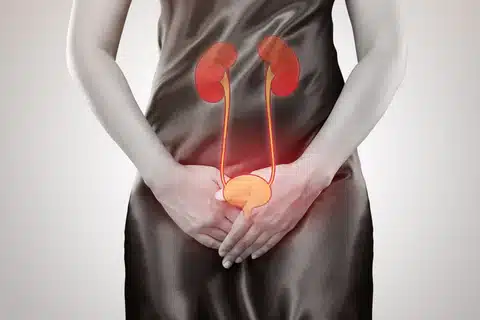In the last two years, all we’ve heard about is COVID-19 and how it affects us, as well as the mortality rates. As we know, COVID-19 is a respiratory disease caused by a new form of coronavirus that was discovered in December 2019. The most common symptoms we’re told to look out for are fever, cough, tiredness, and loss of taste or smell. Less common symptoms include a sore throat, headache, aches and pains. And then there are the more serious symptoms including difficulty breathing, shortness of breath, loss of speech, loss of mobility, confusion, and chest pain. But now researchers at Stanford University have found that a third of COVID-19 patients have symptoms affecting the digestive system. So today we’re going to discuss, is diarrhea a COVID symptom and what do gastrointestinal system symptoms mean for COVID-19 patients.

What’s the Link Between COVID-19 and Gastrointestinal Symptoms?
Once any virus infects the body, it can destroy healthy cells and make multiple copies of itself. COVID-19 is known to mainly attack the cells lining the airways. This is what makes it hard for patients to breathe and can lead to pneumonia. However, researchers are beginning to believe that COVID-19 might not only harm the digestive tract, but could actually originate there. Researchers at Stanford University found that nearly a third of patients studied, with mild cases of COVID-19, had gastrointestinal symptoms. Another study by researchers in Beijing found that anywhere between 3% to 79% of people with COVID-19 develop gastrointestinal symptoms.
Associate Professor Martin Veysey from the University of Hull, UK, suggests that if a patient presents with only gastrointestinal symptoms, without any respiratory ones, they should still consider testing for COVID-19.
“We shouldn’t across the board test those with solely gastrointestinal symptoms,” he warns. “But there should be recognition that people could have this symptom alone. [For example] you could make the case for testing someone who has only these symptoms [if they are] from a hot spot or work in a high-risk occupation or industry.”

Is Diarrhea a COVID Symptom?
Diarrhea is a COVID symptom and is commonly occurring enough that it’s being added alongside sore throats and headaches as a symptom to watch out for. A study from the American Journal of Gastroenterology examined 206 patients with a mild case of COVID-19. They found that 48 COVID-19 positive patients had only digestive symptoms. And 69 patients had both respiratory symptoms. Finally, of the combined total of 117 people who reported gastric distress 19.4% experienced diarrhea as their first COVID symptom.
Other Gastric Distress Symptoms of COVID-19
As well as diarrhea, patients also experienced other gastric symptoms either alone or alongside respiratory symptoms. These include the following:

Vomiting
Research from Beijing found that vomiting is more common in children with COVID-19 than in adults. Researchers in Beijing analysed all COVID clinical studies and case reports related to digestive issues and found that 3.6% to 15.9% percent of adults who were COVID-19 positive experienced vomiting, while 6.5% to 66.7% of children experienced vomiting.

Loss of Appetite
Many people who have developed COVID-19 have reported losing their appetite. This often happens alongside other gastrointestinal symptoms. Further, the same study from Beijing reports that 39.9% to 50.2% of COVID patients experience a loss of appetite during their illness.
Other Gastrointestinal Symptoms of COVID-19
Several other gastrointestinal symptoms have been reported by patients with COVID-19. According to the Beijing study:
- 1%-29.4% of patients experience nausea
- 2.2% to 6% of patients experience abdominal pain
- 4% to 13.7% of patients experience gastrointestinal bleeding

Can I Have Diarrhea Without a Fever?
As we discussed above, diarrhea can be the first symptom of COVID-19. Some patients experience diarrhea without any flu-like symptoms. In fact, in some cases, flu like symptoms may only develop after diarrhea. And some patients may only ever experience gastrointestinal symptoms without any of the more common respiratory symptoms.

What If I Already Suffer from a Gastrointestinal Disorder?
Unfortunately, those with existing gastrointestinal disorders, like inflammatory bowel disease are at an increased risk of developing viral infections. As of yet, there has been no link between existing gastrointestinal disorders and an increased risk of COVID-19. However, new information is emerging rapidly and anyone with a compromised immune system or incontinence should be wary. This means you should:
- Frequently wash your hands
- Cover your face when coughing or sneezing
- Avoid people with flu-like symptoms
- Stay at home when possible

What Should I Do If I Have Diarrhea or Other Symptoms?
If you are suffering from diarrhea or other gastrointestinal symptoms like loss of appetite, nausea, or abdominal pain, remember these could have many other causes than COVID-19. Experiencing any of these symptoms doesn’t mean you have COVID, but they could be early warning signs.
You can treat gastrointestinal symptoms of COVID-19 at home by doing the following:
- Stay hydrated
- Avoid foods that you know upset your stomach
- Rest as much as possible

When to See a Doctor About Diarrhea and Other Symptoms
If your symptoms are mild, it is best to stay home and minimise contact with other people. More than 80% of people with COVID-19 will develop mild symptoms. These can be generally handled at home by staying hydrated and resting as much as possible. If you are concerned and want to speak to a doctor, many clinics offer phone or video appointments to discuss your symptoms. From there you and your doctor can decide if you need to go to the hospital.
If you develop more serious symptoms, seek immediate medical attention. Serious symptoms include:
- Having trouble breathing
- Pain or pressure in the chest
- Confusion or an inability to wake up
- Blue lips or face
Holistic Incontinence has a range of incontinence products to help you handle your incontinence issues. Explore our range of products today or contact us today for more information.
